-

人教版新目标初中英语七年级上册What time do you go to school教案
知识与能力复习词汇time,morning,breakfast,get up,g0 t0 bed,homework,clock,afternoon,lunch,run,watch TV,evening,dinner,eat,usually,o’clock,thirty,fifteen,take a shower,go t0 school等;引导学生复习、巩固“询问和谈论时间”的目标语言并运用所学知识安排自己的学习和课外活动。过程与方法运用Summarizing,Classifying和Comparing的学习策略。在复习教学中,运用听写、提问、对话演练与调查活动,促使学生不断地使用所学内容,从而提高他们灵活运用知识的能力。情感态度价值观本部分的主要内容是复习“日常作息时间”的询问和表达。通过互相询问或谈论自己或对方的作息时间安排和活动计划,培养学生良好的作息习惯和守时习惯。教学重、难点及教学突破重点复习词汇time,morning,breakfast,get up,g0 to bed,homework,clock,afternoon,lunch,run,watch TV,evening,dinner,eat,usually,o’clock,thirty,fifteen,take a shower,go to school等;引导学生复习、巩固“询问和谈论时间”的目标语言。
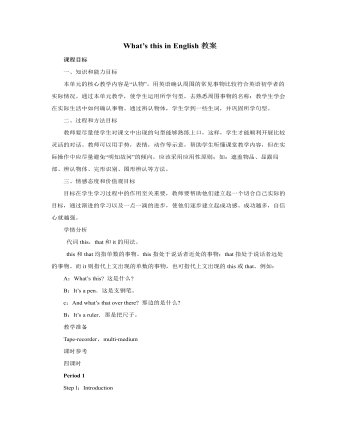
人教版新目标初中英语七年级上册What’s this in English教案
一、知识和能力目标本单元的核心教学内容是“认物”。用英语确认周围的常见事物比较符合英语初学者的实际情况。通过本单元教学,使学生运用所学句型,去熟悉周围事物的名称;教学生学会在实际生活中如何确认事物。通过辨认物体,学生学到一些生词,并巩固所学句型。二、过程和方法目标教师要尽量使学生对课文中出现的句型能够熟练上口,这样,学生才能顺利开展比较灵活的对话。教师可以用手势,表情,动作等示意,帮助学生听懂课堂教学内容,但在实际操作中应尽量避免“明知故问”的倾向,应该采用应用性原则;如:遮盖物品、显露局部、辨认物体、完形识别、图形辨认等方法。三、情感态度和价值观目标目标在学生学习过程中的作用至关重要,教师要帮助他们建立起一个切合自己实际的目标,通过渐进的学习以及一点一滴的进步,使他们逐步建立起成功感。成功越多,自信心就越强。
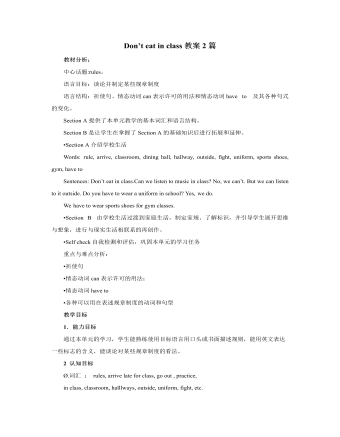
人教版新目标初中英语七年级下册Don’t eat in class教案2篇
Don’t fight. =You can’t fight. (板书,教读)教师把这些句子板书在黑板上,并请学生大声整齐地读祈使句和“can’t”句型,并让学生注意两种句型表达形式的不同和转换,“Don’t …=You can’t…”;并对学生说:These are our school rules. (板书,教读) You can’t break the school rules. Don’t break the school rules.(板书,教读)步骤3 :Practicea. T: Now, each of the students is breaking one of these rules.Please finish 1a.学生看图,完成1a的内容,检查答案并大声朗读校规。b. 听录音,完成1b,选出四位学生都违反了哪条校规;听之前,学生要读会英文名。c. 请两位学生朗读1c部分的句型;要求学生两人一组对话表演,SA扮演外校转来新生,SB告知本校校规。(学生可经过讨论,多说出他们想到的校规,不必只限于书上;教师应给予帮助)2) 第二课时(2a~4)步骤1 :warming up of revisionT: What are the rules at your school?学生使用“can”或祈使句表达各条校规;其中老师可引出“eat in the cafeteria outside”的表达。步骤2 :Practicea.T: Christina is an exchange student. She doesn’t know the rules. Let’s listen, what activities they’re talking about?学生听第一遍时,完成2a;第二遍时,完成2b;b. 请学生领读2c部分,看着2a完成的表格,理解2c活动的要求;分成小组针对2a进行问答;
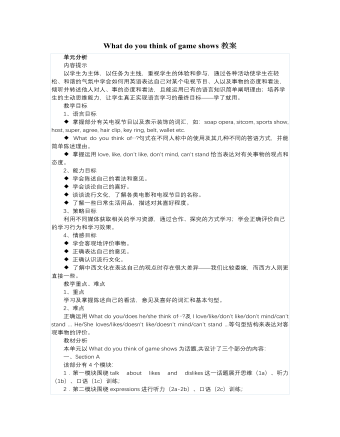
人教版新目标初中英语七年级下册What do you think of game shows教案
五、教学Section B-2c1. Pair work: What do you think of the belt/sunglasses/…? What does your father/mother/… think of your scarf/belt…?2. Group work(1). Teacher shows some different kinds of school uniforms (制服)and asks : “ What do you think of your school uniforms? If you have a chance to choose your school uniforms, what kind would you like to choose?”(2). Discuss in groups.(3).Get some Ss to report in class.说明:这一步旨在让学生运用已有的语言知识谈论对事物的看法和意见,并简单阐明理由,培养学生的主动思维能力和运用英语的能力。六、教学拓展调查电视节目的收视率任务:调查你周围的人对现在各种电视节目的反响。活动过程:1.教师布置任务,让学生调查周围的人(包括他的亲戚朋友和邻居)喜欢收看哪方面的电视节目。2.学生进行调查活动,运用本单元所学的句型What do you think of….? (Why?)What's your favorite game shows?What do you think of talk show?I doesn’t mind it.I like it.I love it.I can’t stand it.3.记录下排在前10位的TV Program,填写调查表,比较其收视率。

人教版新目标初中英语八年级上册Can you come to my party教案3篇
Step 3 (3b)First, tell the students when we talk about our future plans, we often use: I’m+verb+ing When we talk about what we must do, we use have to. Ask the students to fill in the blanks in 3b. The answers are: shopping, go to see, a test, I’m going, my family. Step 4 (3c)Let the students write an e-mail message to a friend. Say why you can’t visit next. Before the exercise, ask the students to give some possible answers and write them on the blackboard. So the students will feel easy to finish the writing exercise. After they finish it, Let them to correct it in groups first. Each group chooses theirs best one to read in front of the whole class. Step 5 ( planning a party )First read the conversation in the box together. Then ask the students to turn to page 88.Write down everything you have to do next week. Write in all the things you have to do . Ask the students to look at the list. Ask them “What day are you free?” This is when you can have your party. Step 6 (Self check 1 )Let the students to fill in the blanks with the words given. Change the forms of the words if possible. Then make their own sentences. The answers are: visit, playing, have to, study, comeStep 7 (Self check 2)Imagine you are Marie. Read the information and look at your schedule. Write replies to the invitation.

人教版新目标初中英语八年级上册Could you please clean your room教案3篇
一、 教学内容Section A 1a----1c二、 教学目标1.学习词汇do the dishes, make the bed, take out the trash, fold the clothes, do the laundry, sweep the floor, clean the living room.2.句型 Could you please clean your room? Yes, sure.三、 教学准备 学生预习本单元所有的词汇多媒体课件 活动表 奖品四、 教学过程Pre-task1. Warming upEnjoy ourselves. Watch cartoon Cinderella. 看动画片段《灰姑娘》导如入本课话题和新词汇“chores”美丽善良的鬼姑娘因继母的嫉妒,每天得做所有的家务。片段的主题使学生联想到本课的话题。2. learn new words and phrasesLook! What is she / he dong? 看图学习动词词组do chores, do the dishes, make the bed, take out the trash, fold the clothes, do the laundry, clean the living room.3. Guessing game.What is she doing ? 4. Pair work. 1a, Do you do these things at home? Write “Y” for “yes” and “N” for “no”.5. Listening . 1b , Peter’s chores or Mom’s chores?理解目标语Could you please clean your room? Yes, sure.Write “M” for Mom’s chores, “P” for Peter’s chores in the chart.6. PairworkLook at the picture,Ask your partner to do the chores that you see. 7. Interview Who is the most able at home? 1) What chores do you do at home? How often do you do the chores? Work in four, interview each of the students in the group, fill in the chart.
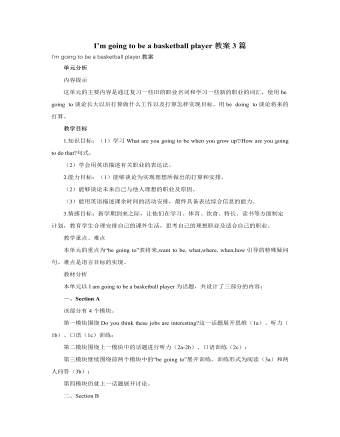
人教版新目标初中英语八年级上册I’m going to be a basketball player教案3篇
教学目标1.知识目标:(1)学习What are you going to be when you grow up?/How are you going to do that?句式。(2)学会用英语描述有关职业的表达法。2.能力目标:(1)能够谈论为实现理想所做出的打算和安排。(2)能够谈论未来自己与他人理想的职业及原因。(3)能用英语描述课余时间的活动安排,最终具备表达综合信息的能力。3.情感目标:新学期到来之际,让他们在学习、体育、饮食、特长、读书等方面制定计划,教育学生合理安排自己的课外生活,思考自己的理想职业及适合自己的职业。教学重点、难点本单元的重点为“be going to”表将来,want to be, what,where, when,how引导的特殊疑问句。难点是语言目标的实现。教材分析本单元以I am going to be a basketball player为话题,共设计了三部分的内容:一、Section A该部分有4个模块。第一模块围绕Do you think these jobs are interesting?这一话题展开思维(1a)、听力(1b)、口语(1c)训练;
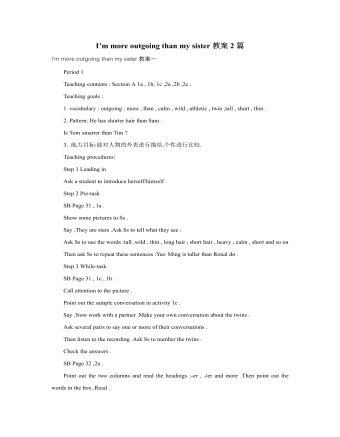
人教版新目标初中英语八年级上册I’m more outgoing than my sister教案2篇
1 交通工具的比较此活动为小组活动。学生通过讨论找出到达某一城市可乘坐的各种交通工具,并选择最佳出行方式。Teacher:We’re going to Shanghai. How many ways can we use to get there? Yes, there are four ways: by bus, by plane, by train, by ship. Please discuss how you are going to get there.操作建议:(1)学生以小组为单位展开活动,谈论本组所选择的交通工具。(2)各组选代表向全班汇报,阐述本组所选择的交通工具的利和弊。完成任务所需要的语言结构:We can go there by ship. It’s more comfortable and cheaper than any other transportation.We can go there by bus. It’s cheaper but it takes longer time.2 哪个城市更合适?此活动具有挑战性。假设中国要举行2014年世界杯足球赛,分别从历史,人文,天气等方面对各城市(北京,大连,上海,昆明)进行比较,选择最佳举办城市。T: Imagine China is holding the 2014 FIFA World Cup. Which city do you think is the best for the World Cup, Beijing, Dalian, Shanghai or Kunming? Let’s work in groups. If you choose Beijing, please join the Team Red. If you chose Dalian, please join the Team White. If you choose Shanghai, please join the Team Blue. If you choose Kunming, please join the Team Green. Please show us its advantages. Then let’s see which team will win.

人教版新目标初中英语八年级下册He said I was hard-working教案2篇
This activity introduces some new vocabulary and provide oral practice using the target language.Task 1 . Ask four students to stand in front of the class, and the teacher asks them the following questions as a reporter.1.What are you going to do when you grow up?2.What are you going to do next week?3.What are going to do after school?The students will give different answers, then ask a good student to report what they said.I am going to e a doctor.What did she say?----------She said she was going to be a doctor.I am going to have a party on Friday night.What did he say?-------He said he was going to have a party on Friday night.I am going to do my homework.What did she say ?------ She said she was going to do her homework.I am going home after school.What did she say?-----She said she was going home after school.Say In this unit we are going to learn to use words like to report what someone said.Task 2. Read the instructions. Then ask a student to read the four questions. And write the words on the Bb. Explain what soap opera is.Task 3. Ask the students to Look at the pictures, point out the TV screens in the picture. Ask one girl to read what Marcia said.What did Marcia say? She said She said she was having a surprise party for Lana on Friday night. Repeat the other pictures in the same way.Activity3. Listen and number the pictures in activity 1a.
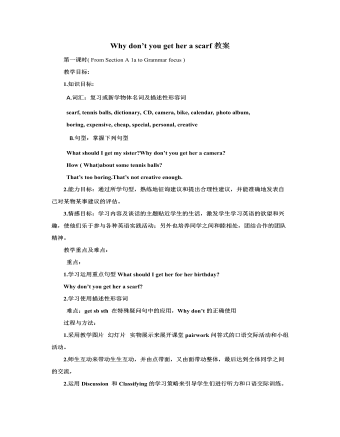
人教版新目标初中英语八年级下册Why don’t you get her a scarf教案
教师带领学生复习有关描述宠物的词汇,采用教师提问学生回答的方进行。如:T:What animals do you think would be good pets?What animals do you think would be bad pets?What do you think are good animals for a six-year-old child?然后学生进行 pairwork 练习。Task two: 师生互动,学习探究 1、播放3a部分的录音,引导学生一边听录音,一边跟读。2、通过听录音学生回答以下问题:Why do you think pot-bellied pigs are popular?What are the advantages and disadvantages of keeping such a pet?教师对学生的回答进行及时点评。3.学习范文,学习重点短语,为下步的模仿写作提供语言素材。T :1. )Have you ever kept a pig as a pet?Do you like pigs? St.:No.…Why don’t you like to keep a pig? St: No.They’re too dirty and lazy(Do you know in some foreign countries like Hollyland, Australia,pigs are the most popular pet.there’s a kind of pig.(图)it has an interesting name? it ‘s called a pot-bellied pig.) Now,let’s learn an article about this kind of interesting pet.2.)play the tapeSt.:Listen and repeat3.)show some Qs on computer(本子St.: read silently,then answerthe Qs(本子)4.)Ask ss. Close book and retell this passage.(what is a pot-bellied pig? Is it a good or bad pet? ) St.: retell it to each other“A pot –bellied pig is a popular pet now…”5.read the article together.St.:.practice reading

人教版新目标初中英语九年级上册Teenagers should be allowed to choose their own clothes教案2篇
Step 1 Greeting Greet the class and check the homeworkStep 2 A duty report The S on duty gives a report on the rules in his home and lead in 3a “Sun Fei’s and Wu Yu’s rules” Step 3 ReadingSs read the conversation and write the two girls’ rules in the chart. Check the answers.Get Ss to read after the tape and then read aloud by themselves. Then, T explains the language points.Step 4 Pairwork 3bRole play. Use the information in chart to practice with the conversation in 3a covered. They can look at the sample conversation in the right box.Step 5 Task 2 “Who’s the best reporter?”Make a survey by asking any 5 students the questions in the chart in activity 4. Then give out a report about it. See who is the best reporter? And the best reporter will get a nice ball-pen.Step 6 Summary and homework:Write out the report in your exercise-books.Period ThreeStep 1 Greeting and a duty reportThe S gives a duty report talking about his experience of being late for school. Lead in the question “Do you ever get to school late? How often do you get to school late? Always, usually, sometimes, or never?Step 2 1a Get Ss to finish writing.Step 3 Pairwork 1b Get Ss to talk about their answers with their partners using the sample conversation in the box on the right.Step 4 Listening practice2a Lead-in: What will happen if you get to school late? What about Peter? Let’s listen to a conversation between Peter and his father. Get Ss to finish 2a (As usual, for the first time, Ss only listen.) Check the answers.
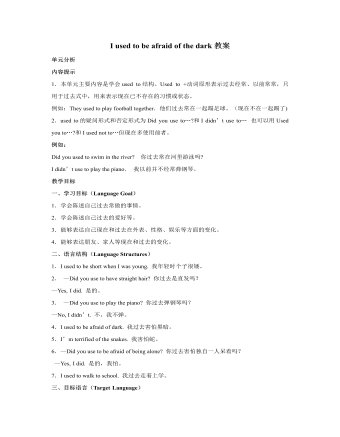
人教版新目标初中英语九年级上册I used to be afraid of the dark教案
内容提示1.本单元主要内容是学会used to结构。Used to +动词原形表示过去经常、以前常常,只用于过去式中,用来表示现在已不存在的习惯或状态。例如:They used to play football together.他们过去常在一起蹋足球。(现在不在一起踢了)2.used to的疑问形式和否定形式为Did you use to…?和I didn’t use to… 也可以用Used you to…?和I used not to…但现在多使用前者。例如:Did you used to swim in the river? 你过去常在河里游泳吗?I didn’t use to play the piano. 我以前并不经常弹钢琴。教学目标一、学习目标(Language Goal) 1.学会陈述自己过去常做的事情。2.学会陈述自己过去的爱好等。3.能够表达自己现在和过去在外表、性格、娱乐等方面的变化。4.能够表达朋友、家人等现在和过去的变化。二、语言结构(Language Structures) 1.I used to be short when I was young. 我年轻时个子很矮。 2. —Did you use to have straight hair? 你过去是直发吗?—Yes, I did. 是的。 3. —Did you use to play the piano? 你过去弹钢琴吗?—No, I didn’t. 不,我不弹。 4.I used to be afraid of dark. 我过去害怕黑暗。 5.I’m terrified of the snakes. 我害怕蛇。
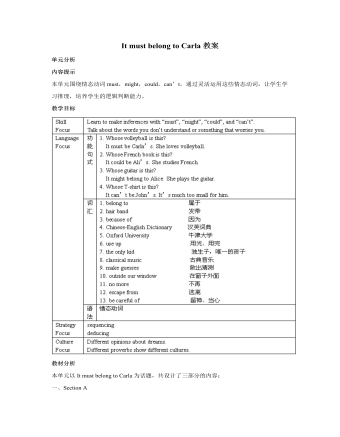
人教版新目标初中英语九年级上册It must belong to Carla教案
一、Section A该部分有4个模块。第一模块围绕Whose volleyball is this? 这一话题展开思维( 1a)、听力(1b)、口语( 1c)训练;第二模块围绕上一模块中的话题进行听力( 2a-2b)、口语训练( 2c);第三模块继续围绕前两个模块中的“making inferences”展开训练。训练形式为阅读排序( 3a)和两人问答(3b);第四模块仍就上一话题展开讨论。二、Section B该部分有4个模块。第一模块要求根据图画和所提供的单词写出合理的句子;第二模块在听力( 2a-2b)和分角色口语训练( 2c)的基础上,继续进行“推测”训练; 第三模块围绕“Strange events in Bell Tower neighborhood”这一话题展开阅读( 3a)和写作(3b -3c)训练;第四模块以dream为话题展开小组活动。三、Self Check该部分有3个模块。第一模块以填空形式对所学词汇进行训练;第二模块就8个谚语展开阅读和讨论。
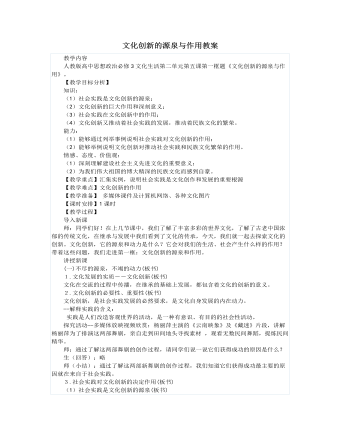
人教版高中政治必修3文化创新的源泉与作用教案
(三)呼唤文化创新的时代(板书)1.人民群众是文化创造的主体--(板书)师:【图片文字展示】--《离骚》、《九歌》、《水浒传》、《三国演义》均取材自民间,在民间口述文字的基础上加工形成,所以,我们可以看到,文化创新的主体是谁?生:人民群众是文化创造的主体师:在新的历史时期,我们的青少年应该怎么做?生:虚心向人民群众学习,从人民群众的伟大实践和丰富多彩的生活中汲取营养,这是当代中国文化工作者的使命和职责。2.文化工作者必须坚定地走与人民群众的实践相结合的道路--(板书)3.当代中国文化创作者的使命和职责。(板书)【课堂小结】通过本节课的探究学习,我们认识到文化创新的源泉和作用,要求我们虚心向人民群众学习,从人民群众的伟大实践和丰富多彩的生活中汲取营养,刻苦钻研,锐意创新,为全面建设小康社会而奋斗。

新人教版高中英语必修1Unit 1 Teenage Life-Listening and Speaking & Listening and Talking教案
Step 2 Listening and Talking1. The teacher is advised to talk with their new students about the related topic: Boys and girls, do you know some structures to talk about future activities? Talking about future activitiesWe’ll …I plan to …There’ll be …I hope to …We’re going to …2. After their small talk, the teacher can move on by playing the listening and solve the following task.Underline the expressions in the sentences below Cao Jing and Max use to talk about the future.We’ll learn useful skills.I plan to improve my spoken English.There’ll be students from different schools.I hope to make new friends.We’ll talk about teenage life.I’ll learn to make a fire.There’ll be students from different countries at the camp.There’ll be some experts there to show us how to live in the wild.We’re going to learn about wildlife.I’m going to give a speech.I think I’m going to enjoy the activities.I think we’ll have a lot of fun.3. Work in groups. Plan a youth camp.Teacher make the Ss think of ideas for the camp. And they can use the questions below to get started. And have the Ss present their ideas for a youth camp to the class.●What kind of camp is it?●Who will be there?●What will they do?●What will they learn?

新人教版高中英语必修1Unit 2 Travelling Around-Listening and Speaking & Listening and Talking教案
【教学目标与核心素养】1. Instruct students to get main facts by listening and motivate them to talk about the topics about how to prepare for the trip and make reservations by listening and ultimately can make travel arrangements and reservations. 2. Develop students’ sense of cooperative learning and individual thinking capability. 3. Develop students’ different listening skills to solve different listening comprehensive problems.4. Help students to understand how to use the structures “the present continuous tense (be doing) is used to express future plans.【教学重难点】1. Teach students how to focus on key words, not on single words or grammar.2. Prompt Ss to talk about the related topics, such as how to prepare for the trip and make a travel plan.【教学过程】Step 1: Listening and SpeakingLead inThe teacher is advised to talk with their students about the places that they want to travel most both at home and abroad: boys and girls, if you have a chance to travel around the world, where will you go? After their small talk, the teacher can move on by finishing the following listening task:Before travelling, what do we need to prepare for the trip?
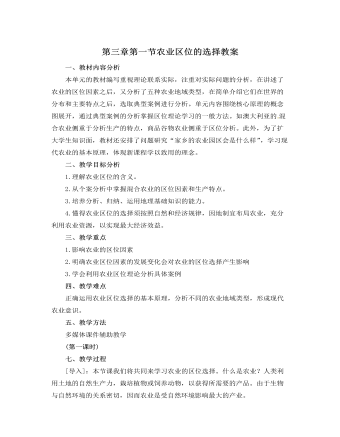
人教版新课标高中地理必修2第三章第一节农业区位的选择教案
1.澳大利亚混合农业地域在生产结构、经营方式、科技应用、农业专业化和地域化等方面有哪些特点?2.在澳大利亚混合农业地 域形成的过程中,有哪些区位因素在起作用?学生发言,教师适当引导、评点并作讲解。[教师提问]:那么,澳大利亚的墨累—达令盆地的区位因素有什么不足之处?知识拓展:课件展示澳大利亚大分水岭的雨影效应的形成原理及东水西调示意图。[教师讲解]:澳大利亚东南部受大分水岭的影响,降水集中于大分水岭的东侧,在其西侧形成山地的雨影效应,降水丰富地区与农业生产地区分布不一致,灌溉成为澳大利亚农牧业发展的限制性条件。因此,澳大利亚对水利工程建设很 重视,东水西调促进了墨累—达令盆地农牧业的发展。[课堂小结]:这节课我们学习了农业区位选择的基本原理。 通过学习我们了解到,农业的区位选择实质上就是对农业土地的合理利用。
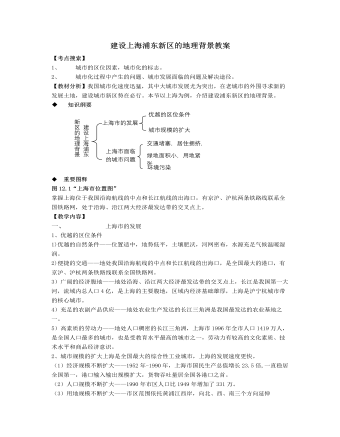
人教版高中地理选修2建设上海浦东新区的地理背景教案
2、上海是全国最大的商业中心,上海港是全国最大的港口。商业中心区位选择因素与港口的区位选择因素的共性条件是( )A、自然地理条件B、经济地理条件C、地理位置D、经济腹地3、中国政府宣布开发上海浦东的时间是( )A、1978年B、1985年C、1989年D、1990年4、有关上海优越区位条件的叙述,错误的是( )A、长江三角洲可提供充足的农副产品B、是全国最大的交通枢纽C、是我国最大城市带的核心城市D、是我国面积最大的直辖市5、目前上海市面临的最主要的人口问题是( )A、人口老龄化,青壮年赡养照顾众多老人负担过重B、卫星城镇人口比重大C、人口基数大,自然增长率高D、人口年龄构成轻,生育高峰压力大6、城市问题产生的主要原因是( )A、城市规模扩大B、城市基础设施相对滞后C、城市管理混乱D、城市人口规模和经济规模的迅速扩大7、下列可反映上海市的城市问题的是( )A、上海市区人均道路面积略高于北京市区B、上海市沙尘暴天气多发C、上海市许多家庭三代人同室居住D、上海市人均绿地面积稍高于重庆
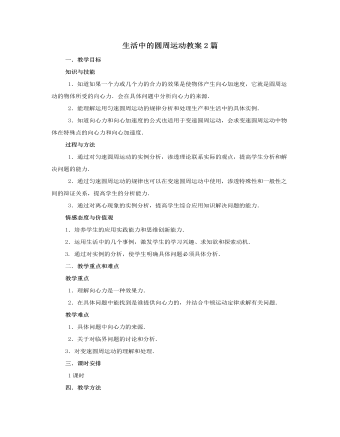
人教版新课标高中物理必修2生活中的圆周运动教案2篇
思考:洗衣机脱水时转速高时容易甩干衣物,还是转速低时容易甩干衣物?(2) 制作棉花糖的原理内筒与洗衣机的脱水筒相似,里面加入白砂糖,加热使糖熔化成糖汁。内筒高速旋转,黏稠的糖汁就做离心运动,从内筒壁的小孔飞散出去,成为丝状到达温度较低的外筒,并迅速冷却凝固,变得纤细雪白,像一团团棉花。5.离心现象的防止在水平公路上行驶的汽车,转弯时所需的向心力是由车轮与路面的静摩擦力提供的。如果转弯时速度过大,所需向心力F大于最大静摩擦力Fmax,汽车将做离心运动而造成交通事故。因此,在公路弯道处,车辆行驶不允许超过规定的速度。当高速转动的砂轮或者飞轮内部分子间相互作用力不足以提供所需向心力时,离心运动就会使他们破裂,甚至酿成事故。
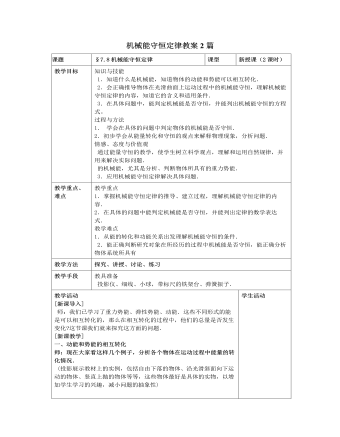
人教版新课标高中物理必修2机械能守恒定律教案2篇
(二)进行新课1、动能与势能的相互转化演示实验1:如右图,用细线、小球、带有标尺的铁架台等做实验。把一个小球用细线悬挂起来,把小球拉到一定高度的A点,然后放开,小球在摆动过程中,重力势能和动能相互转化。我们看到,小球可以摆到跟A点等高的C点,如图甲。如果用尺子在某一点挡住细线,小球虽然不能摆到C点,但摆到另一侧时,也能达到跟A点相同的高度,如图乙。问题:这个小实验中,小球的受力情况如何?各个力的做功情况如何?这个小实验说明了什么?学生观察演示实验,思考问题,选出代表发表见解。小球在摆动过程中受重力和绳的拉力作用。拉力和速度方向总垂直,对小球不做功;只有重力对小球能做功。实验证明,小球在摆动过程中重力势能和动能在不断转化。在摆动过程中,小球总能回到原来的高度。可见,重力势能和动能的总和保持不变。即机械能保持不变。

